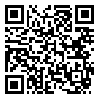BibTeX | RIS | EndNote | Medlars | ProCite | Reference Manager | RefWorks
Send citation to:
URL: http://jhsw.tums.ac.ir/article-1-5853-en.html

 , Iraj Alimohammadi2
, Iraj Alimohammadi2 
 , Mojgan Karbakhsh3
, Mojgan Karbakhsh3 
 , Hassan Ashayeri4
, Hassan Ashayeri4 
 , Farideh Sadeghian *
, Farideh Sadeghian * 
 5, Shahrbanoo Goli6
5, Shahrbanoo Goli6 
 , Mahsa Fayaz7
, Mahsa Fayaz7 

2- Associate professor, Department of Occupational Health Engineering, School of Public Health, Iran University of Medical Sciences, Tehran, Iran
3- Associate professor, Department of Community Medicine, School of Medicine, Tehran University of Medical Sciences, Tehran, Iran
4- Professor , Department of Basic Sciences in Rehabilitation, School of Rehabilitation, Iran University of Medical Sciences, Tehran, Iran
5- M.Sc., Department Occupational Health Engineering, Sina Trauma and Surgery Research Center, Tehran University of Medical Sciences, Tehran, Iran ,
6- Assistant professor, Center for Health Related Social and Behavioral Sciences Research, Shahroud University of Medical Sciences, Shahroud, Iran
7- Lecturer, Department of Epidemiology and Biostatistics, School of Public Health, Shahroud University of Medical Sciences, Shahroud, Iran
Introduction: Impairment of alertness, attention and performance associated with sleepiness and fatigue in nurses occur in night and long-term shifts that in the end of night shift reach to the maximum level can lead to traffic accidents when they returning home. The purpose of this study was to determine the effect of night shift on psychomotor abilities of driving in nurses after shiftwork.
Material and Method: A cohort study was carried out on 23 night shift and 24 day shift female nurses aged 20 to 40 at Sina Hospital in Tehran city, using the Vienna Test System (VTS). The concentration and selective attention, reaction time, pheriperal perception, and coordination before and after night and day shifts were measured. A multiple linear regression model and Backward stepwise selection method was used for analyses.
Result: In the concentration and selective attention test, sum hits (p = 0.038) and in the visual perception test , divided attention (p =0.006) and visual field (p =0.019), and in the reaction time test the mean motor time (p =0.034) showed a significant adverse relationship with working in night shift, but the visomotor coordination variables did not show any significant correlation.
Conclusion: The results showed that the concentration and selective attention, peripheral perception, and reaction time of psychomotor ability of driving were significantly adversely impaired in nurses after night shift. These results in evidence of the mechanism of increasing traffic accidents after night shift among nurses added to the previous studies in this subject.
Received: 2018/06/22 | Accepted: 2018/06/22 | Published: 2018/06/22
| Rights and permissions | |
 |
This work is licensed under a Creative Commons Attribution-NonCommercial 4.0 International License. |



